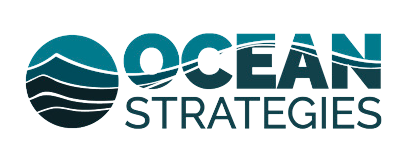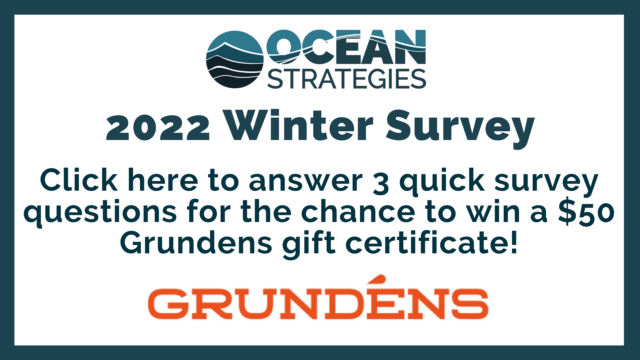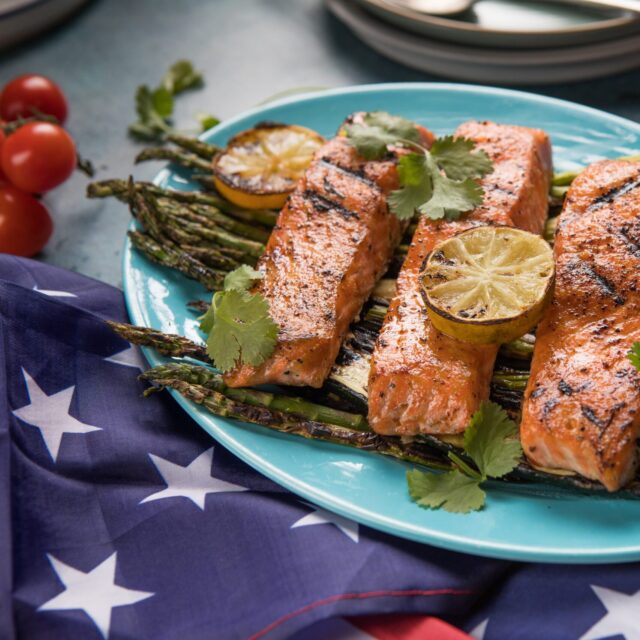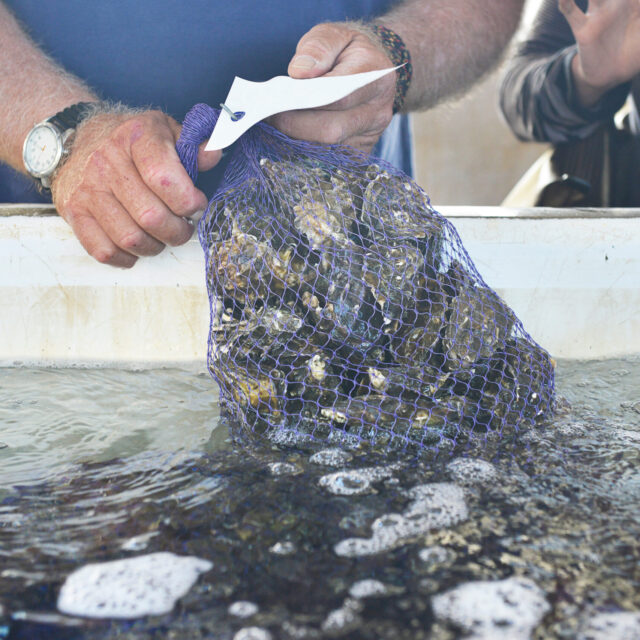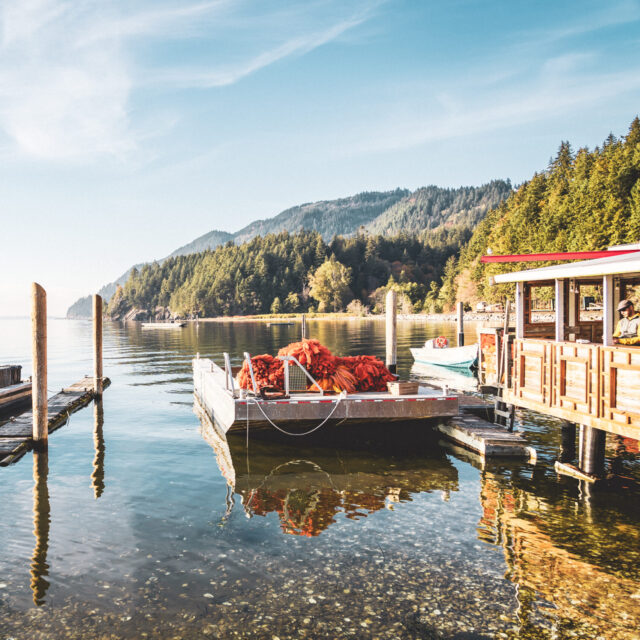
The Ocean Strategies Fisheries Policy Report provides timely policy and industry updates that connect America’s sustainable seafood supply chain — including grocers, restaurants, distributors, transportation and the many other businesses that depend upon seafood access.
Not already signed-up? Receive future updates by signing up.
WHAT WE’RE WATCHING IN FEDERAL FISHERIES POLICY
SEAfood Act introduced in the House
The latest in a flurry of aquaculture-focused federal policy
On December 8, Rep. Alan Lowenthal (D-CA) introduced the Science-based Equitable Aquaculture Food Act, or SEAfood Act. This bipartisan bill, co-sponsored by Reps. Julia Brownley (D-CA), Nancy Mace (R-SC), Chellie Pingree (D-ME), and Jimmy Panetta (D-CA), prioritizes data and science on the path to developing a more equitable, inclusive, and sustainable offshore aquaculture industry.
The SEAfood Act would direct government agencies to produce scientific reports and assessments regarding the feasibility of offshore aquaculture development, as well as instate a grant program for aquaculture education and career development at institutions for traditionally underserved communities.
Key provisions in the SEAfood Act:
-
Government Accountability Office (GAO) study: charges the office to produce a report that highlights lessons learned in aquaculture permitting, monitoring, and regulations in the 15 years since the GAO’s 2008 assessment.
-
This study includes analyzing the impact on wild-capture fisheries products as a result of the introduction of aquaculture products to the marketplace.
-
-
National Academies of Sciences, Engineering, and Medicine study: directs NASEM to complete a study on the scientific basis for efficient and effective regulation of offshore aquaculture.
-
National Oceanic and Atmospheric Administration (NOAA) assessment program: authorizes NOAA to establish an offshore aquaculture assessment program to gather data from on-the-water demonstration projects
-
This program includes a state opt-out provision for offshore pilot projects.
-
- Grant program for minority-serving institutions: creates a grant program under NOAA for minority-serving institutions, historically Black colleges, and Tribal colleges to further develop their aquaculture curricula through Aquaculture Centers of Excellence in order to promote career development.
The SEAfood Act follows the introduction of the House Aquaculture Caucus in early October, made up of 13 Congressional representatives seeking to educate Congress about the economic opportunities of a more robust domestic aquaculture industry. In September, a list of new cosponsors for the AQUAA Act was announced. This bill was reintroduced in 2021 and would establish a regulatory framework for U.S. offshore aquaculture.
Next steps for the SEAfood Act
-
U.S. Sen. Kirsten Gillibrand (D-NY) will push a companion bill in the U.S. Senate.
-
Any bills not passed before the new Congressional session begins in January 2023 must be refiled. Rep. Lowenthal is not seeking re-election so a new champion in the House would need to refile the SEAfood Act.
Resources
-
A recent report published in Marine Policy by R. Fujita et al. highlights how the offshore aquaculture industry can be managed and regulated, citing its strong potential while emphasizing that knowledge gaps remain before reaching this point.
-
Read this op-ed in the LA Times from Environmental Defense Fund’s Eric Schwab and award-winning chef Mary Sue Milliken, praising the SEAfood Act’s introduction.
-
Check out the recent Ocean Strategies Fall 2022 Aquaculture Policy Report to learn more about policy developments, mariculture industry growth, and other aquaculture happenings.
IUU Fish Fight: A Five-Year Strategy
NOAA-led working group releases plan to combat illegal fishing
The U.S. Interagency Working Group on IUU Fishing released a new report in October detailing a five-year strategy for combating Illegal, Unreported, and Unregulated (IUU) fishing, with the goal of promoting maritime security worldwide. IUU fishing refers to a variety of fishing activities that violate both national and international regulations.
The Working Group is made up of 21 federal agencies and chaired by NOAA. It was established under the Maritime Security and Fisheries Enforcement (SAFE) Act, a bill passed in 2019 with the goal of promoting a government strategy to combat IUU fishing in addition to other maritime threats.
The “National Five-Year Strategy for Combating Illegal, Unreported, and Unregulated Fishing” outlines measures that will increase governmental capacity to enforce rules and regulations to mitigate the effects of IUU fishing, while collaborating with foreign partners to do so. It calls for new technologies to improve global governance, conservation, and management measures.
Five flag states and administrations identified in the strategy will work alongside the United States. Ecuador, Panama, Senegal, Taiwan, and Vietnam are all located in high IUU fishing priority areas and have demonstrated willingness to fight IUU fishing. This cooperative approach is geared toward building global capacity via collaboration to address IUU fishing.
The release of the strategy follows a June 2022 proposed rule from NOAA that would allow the agency to broaden its scope when considering measures to fight not only IUU fishing but forced labor in the seafood supply chain.
More on IUU fishing:
-
U.S. Sens. Dan Sullivan (R-Alaska) and Sheldon Whitehouse (D-R.I.) introduced the Fighting Foreign Illegal Seafood Harvest (FISH) Act in August 2022, a bill that would ban vessels from U.S. ports and waters if they are known to be involved in illegal fishing. This legislation targets foreign illegal, unreported, and unregulated fishing by creating a blacklist of vessels that have engaged in IUU fishing, bolstering the U.S. Coast Guard’s enforcement capabilities, and advancing international and bilateral negotiations on international agreements and treaties with a maritime focus.
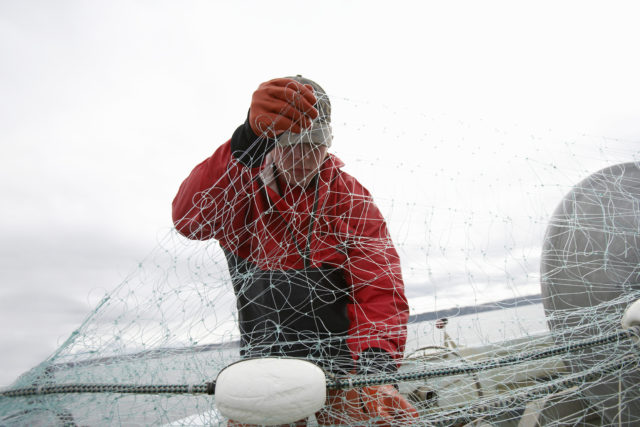
NOAA zeroes in on Communities, Allocations and Bycatch
Magnuson’s National Standards come into focus
How can federal fisheries management be updated without a Magnuson-Stevens Act (MSA) reauthorization? NOAA Fisheries reported earlier this month at the North Pacific Fishery Management Council that it is considering issuing a review of three of the ten national standards that fishery management plans must follow under the MSA. The standards up for review are:
-
National Standard 4 – Allocations
-
National Standard 8 – Communities
-
National Standard 9 – Bycatch
Why update these standards, and why now? It’s been well over a decade since the agency reviewed some National Standards, which guide the eight fishery management councils to ensure sustainable and responsible fishery management. Lack of movement on the latest reauthorization of the Magnuson-Stevens Act, combined with snowballing effects from climate change and the agency’s focus on more equitable fishery management, are part of the impetus for NOAA Fisheries to ask the public to weigh in.
This comes at a time of historic crashes in king crab and salmon populations in the North Pacific. It’s possible that allocation guidance (NS 8) could spur contention in the Gulf of Mexico where recreational fishing has long-fought allocation battles with the commercial and charter-for-hire sectors with species like red snapper and grouper.
And because we don’t believe in coincidences (with policy), the agency’s announcement also comes after Alaskans elected Rep. Mary Peltola for a full term. Peltola is the first Native Alaskan to represent the 49th state in Congress. Given Alaska’s outsized role in the national dialogue on fisheries (as the supplier of nearly 60 percent of the nation’s wild-capture harvest), Peltola’s Pro-Fish platform heightened the attention for decision-makers to curb bycatch and increase community and stakeholder resilience from climate change.
Ocean Strategies expects the updated National Standard guidance debate to heat up in early 2023, and we’ll keep our readers posted on opportunities to learn more and comment.
SEAFOOD SUPPLY CHAIN
Protections for Bristol Bay: one step closer
EPA issues Recommended Determination
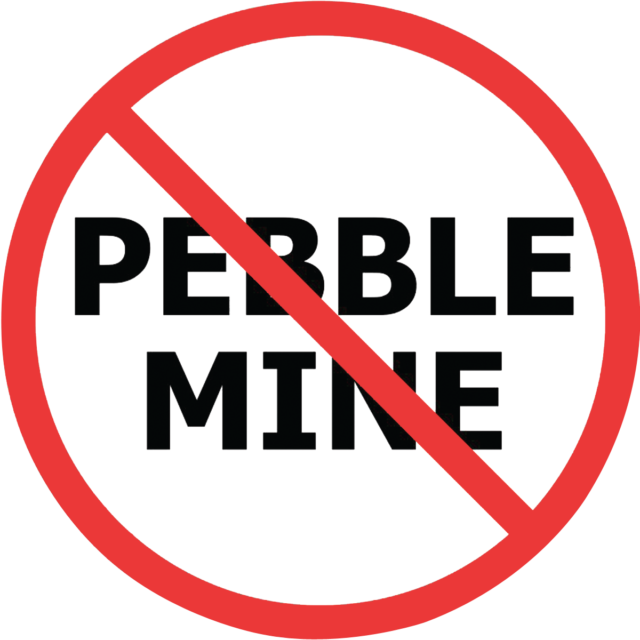 On December 1, the U.S. Environmental Protection Agency (EPA) published a Recommended Determination for Bristol Bay, to enact 404(c) Clean Water Act protections to “prohibit and restrict the use of certain waters in the Bristol Bay watershed as disposal sites… associated with developing the Pebble Deposit.”
On December 1, the U.S. Environmental Protection Agency (EPA) published a Recommended Determination for Bristol Bay, to enact 404(c) Clean Water Act protections to “prohibit and restrict the use of certain waters in the Bristol Bay watershed as disposal sites… associated with developing the Pebble Deposit.”
This is a big step forward in securing protections for the region against the development of Pebble Mine. It follows the publication of a revised Proposed Determination in May 2022 and a subsequent public comment period, of which more than half a million comments were submitted in support of Clean Water Act protections.
Next step: The EPA will have 60 days to consider the Recommended Determination and then decide if they will formalize protections in a Final Determination. This means we could potentially see these protections in place by the end of January 2023.
USDA must provide more seafood in school lunches
GAO report finds USDA purchases far less seafood than other proteins

A recent report published by the Government Accountability Office (GAO) states that the USDA must develop a plan to help provide more seafood in school lunches. The report, titled “National School Lunch Program: USDA Could Enhance Assistance to States and Schools in Providing Seafood to Students,” finds that the department only purchases roughly 3.4 ounces of seafood per student each year. However, USDA nutritional guidelines show that school-age children should eat 4-10 ounces of seafood per week.
Specifically, the plan would support seafood purchasing through the National School Lunch Program (NSLP). One element of the plan is to develop a way for NOAA and the USDA to share information with one another, such as a list of domestic seafood vendors.
In December 2020, U.S. Senators Jack Reed (D-RI), Jeff Merkley (D-OR), and Tammy Baldwin (D-WI) requested the GAO study to determine the factors that limit USDA seafood purchases through its Commodity Purchasing Program (CPP). Upon the release of the GAO findings earlier this month, the Senators sent a letter to the Secretary of Agriculture urging the implementation of the GAO recommendations.
The Seafood Nutrition Partnership (SNP), an organization that is working to build awareness of the health and nutritional benefits of seafood, released a statement applauding the GAO study request from the Senators, and stated that it is eager to work with the USDA and NOAA to develop the GAO recommended plans for the School Lunch Program.
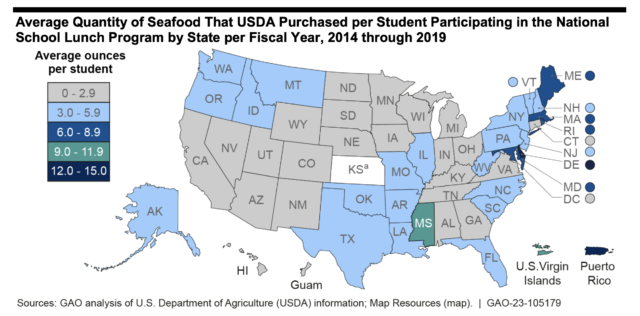
Alaska Bycatch Review Task Force releases final report
North Pacific Council reviews report, rejects emergency action on Bering Sea crab
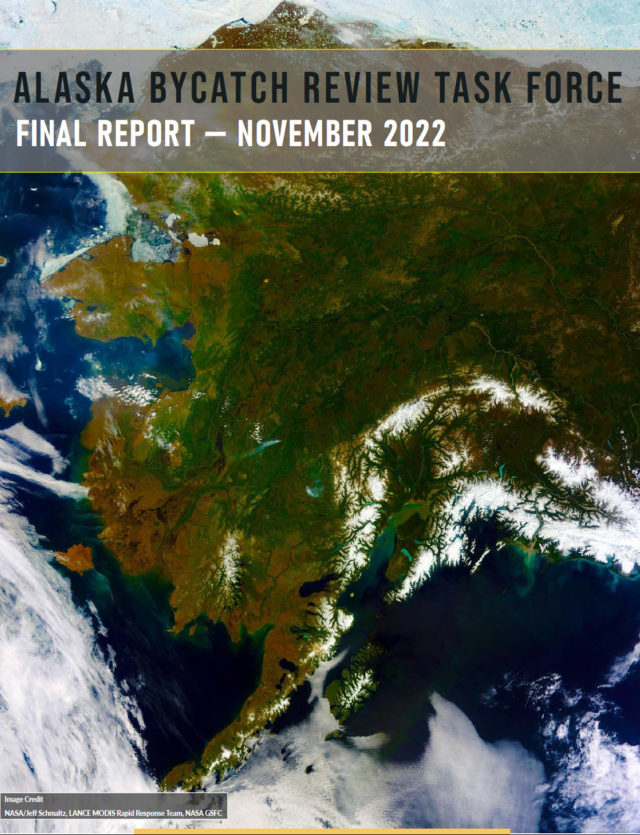 On December 8 the final report from the Alaska Bycatch Review Task Force (ABRT) was released, The report outlines the impacts bycatch has on fisheries and proposes a suite of research and policy recommendations to ensure state agencies are using available resources to better understand the issue. The ABRT stated that reducing bycatch can only be achieved through research, implementation of effective management measures, and public engagement.
On December 8 the final report from the Alaska Bycatch Review Task Force (ABRT) was released, The report outlines the impacts bycatch has on fisheries and proposes a suite of research and policy recommendations to ensure state agencies are using available resources to better understand the issue. The ABRT stated that reducing bycatch can only be achieved through research, implementation of effective management measures, and public engagement.
Bycatch is defined as fish that are unintentionally harvested in a fishery but are not sold or kept. The Alaska Bycatch Review Task Force, made up of 13 voting members politically appointed by Alaska Gov. Mike Dunleavy, was formed in November 2021 to explore the topic of unintended bycatch of high value fishery resources in state and federal waters. The creation of the Task Force was triggered by the collapse of salmon runs in Western Alaska, and the increased public attention to salmon interception at sea.
The report emphasizes that more research is needed to understand the effects of climate change on both marine and freshwater environments, and provides recommendations for how the state can develop research priorities and which areas to focus on.
Other recommendations include more public engagement and outreach on bycatch issues, as well as management recommendations to address Bering Sea and Gulf of Alaska fixed and trawl gear groups. These include a review of open and closed areas, increasing the number of observers on trawl vessels, more electronic monitoring, instating rationalization programs, and prohibited species caps. Specifically, it is recommended that the state establish a chum salmon bycatch cap in the Bering Sea pollock fishery.
The recent collapse of Bering Sea crab stocks has resulted in closures of both the snow crab and red king crab fisheries. The Alaska Bering Sea Crabbers Association called for new crisis responses to this disaster, which includes reducing crab bycatch in the Bering Sea trawl fisheries.
At its December meeting, the North Pacific Fishery Management Council reviewed the Alaska Bycatch Review Task Force final report, as well as considered a closure to fishing in essential red king crab habitat. This emergency action was rejected by the Council.
Read the Alaska Bycatch Review Task Force final report here.
In the news
-
National Fisherman: Alaska Bycatch Review Task Force final report: more rules and research are needed
-
Fishermen’s News: Alaska Bycatch Review Task Force Delivers Recommendations
-
Alaska Beacon: Alaska task force’s final report calls for new rules and more research to address seafood bycatch
OCEAN STRATEGIES 2022 INTERVIEW WRAP-UP
For each Ocean Strategies policy report, we select a featured interviewee to discuss their insights and expertise in the seafood supply chain. Here are a few of our 2022 highlights!
Diani Taylor
5th generation Washington State shellfish farmer
 For the first edition of the Ocean Strategies Aquaculture Policy Report, we chatted with Diani Taylor, fifth generation shellfish farmer in Washington state and Associate Attorney for Plauche & Carr. Diani discussed the importance of seafood stakeholders engaging in discussion around climate issues, making sure shellfish regulatory processes work for farmers, and increasing diversity among sectors in order to ensure a robust, sustainable, and successful seafood supply chain.
For the first edition of the Ocean Strategies Aquaculture Policy Report, we chatted with Diani Taylor, fifth generation shellfish farmer in Washington state and Associate Attorney for Plauche & Carr. Diani discussed the importance of seafood stakeholders engaging in discussion around climate issues, making sure shellfish regulatory processes work for farmers, and increasing diversity among sectors in order to ensure a robust, sustainable, and successful seafood supply chain.
Read the full interview with Diani Taylor and Ocean Strategies Principal Brett Veerhusen on our Ocean Pulse blog or watch and listen on our YouTube channel.
“To have a robust seafood industry, one that is healthy for the long term, it must be increasingly diverse and include more women.”
“There is an opportunity for other sectors to work together on seafood industry issues. This is a hugely untapped potential. Some of the greatest work we’ve seen is when groups come together on their aligned priorities.”
Clayward Tam
Director of Cooperative Fisheries Research, Pacific Islands Fisheries Group
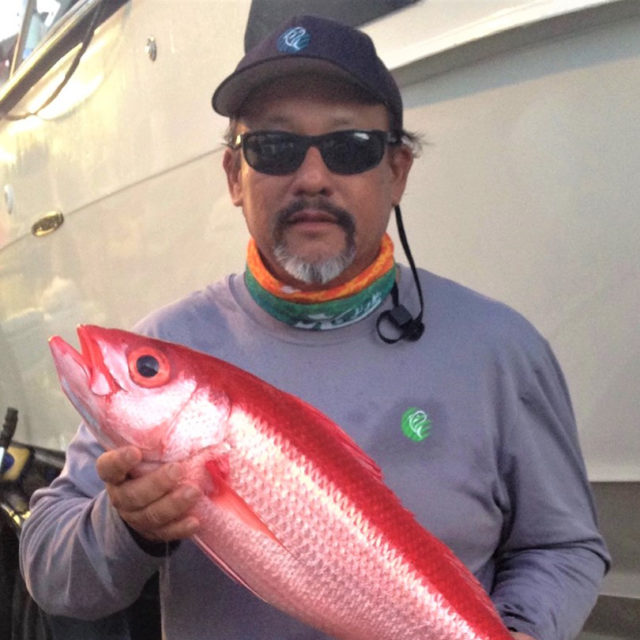 For the Ocean Strategies Summer 2022 Fisheries Policy Report, we interviewed Clayward (Clay) Tam with the Pacific Islands Fisheries Group about what fisheries issues are rising to the top in the West Pacific, how they bring together different islands and voices in the management process, and what can be done to make fisheries management more adaptive, inclusive, and equitable.
For the Ocean Strategies Summer 2022 Fisheries Policy Report, we interviewed Clayward (Clay) Tam with the Pacific Islands Fisheries Group about what fisheries issues are rising to the top in the West Pacific, how they bring together different islands and voices in the management process, and what can be done to make fisheries management more adaptive, inclusive, and equitable.
Read the full interview with Clay Tam and Ocean Strategies Principal Brett Veerhusen on our Ocean Pulse blog or watch and listen on our YouTube channel.
“Fishermen are on the water every single day. They can collect data and help forecast our fisheries. We can look back and forward to inform fisheries management.”
“This is all interrelated. The changes in our environment occur far in advance and this leads to predictability. These are the things we need to pay attention to. The fishermen see it first. We need to document it immediately and report it.”
Monique Coombs
Director of Community Programs, Maine Coast Fishermen’s Association
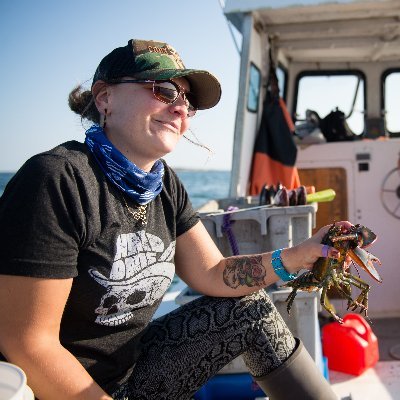 For the Ocean Strategies Spring 2022 Fisheries Policy Report, we interviewed Monique Coombs with the Maine Coast Fishermen’s Association about health and wellness in U.S. fisheries — the challenges, the solutions, and the work she’s doing to bring mental health to the forefront of this conversation.
For the Ocean Strategies Spring 2022 Fisheries Policy Report, we interviewed Monique Coombs with the Maine Coast Fishermen’s Association about health and wellness in U.S. fisheries — the challenges, the solutions, and the work she’s doing to bring mental health to the forefront of this conversation.
Read the full interview with Monique Coombs and Ocean Strategies Senior Consultant, Hannah Heimbuch, on our Ocean Pulse blog.
“Fishermen should be included in health and wellness conversations in a humanizing way. Fishing is so intrinsically tied to a fisherman’s identity.”
“Advocating for more mental health resources for fishermen is about increasing awareness and decreasing stigma.”
OCEAN STRATEGIES TEAM UPDATES
In almost six years we’ve grown into a mighty team of five passionate seafood and fisheries experts. Here’s what we’ve been up to this fall.
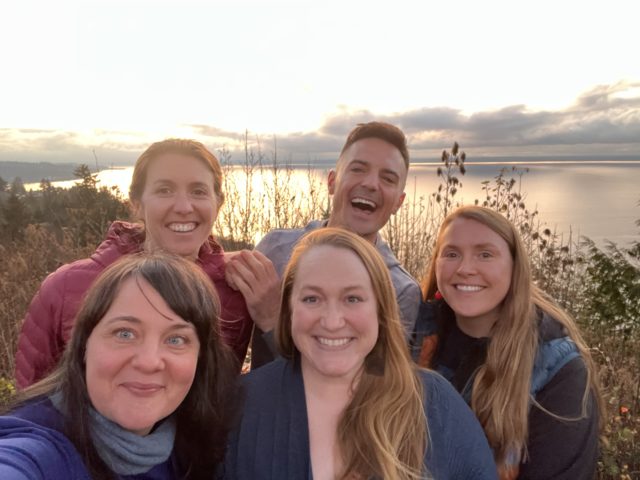
Nothing beats an in-person retreat!
Team Ocean Strategies looks ahead to 2023
After crisscrossing the country but never all in the same place, our bi-coastal team spent three days together in December strategizing our year ahead. With views of Puget Sound to spark creativity, we intimately dove into every client, project, short and long-term goal. We also had a little fun hosting our own “Fish Prom” evening. Thank you to our clients and partners for trusting our team and helping us grow and learn.
Congratulations Jes!
Ocean Strategies Senior Consultant Jessica Hathaway appointed to AFAC
We are so proud that Ocean Strategies Senior Consultant Jes Hathaway was appointed by Secretary of Commerce Gina Raimondo to NOAA’s American Fisheries Advisory Committee. The newly established advisory committee will make recommendations for Saltonstall-Kennedy priorities and grant award funding.
“After following the work that went into creating the American Fisheries Advisory Committee for more than a decade, I am honored to be serving as a founding member, representing New England. Our first meeting proved how dedicated this industry is to opening the door for more and equitable opportunities to promote, develop and sustain U.S. fishing communities,” says Jessica on her appointment.
